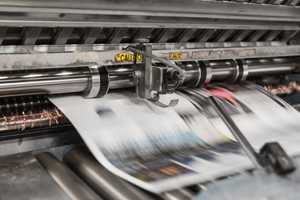You will get in contact? We’d be glad to.
You can call us by phone at the usual business hours.
Our postal address:
Francotyp-Postalia Holding AG
Prenzlauer Promenade 28
13089 Berlin
You can call us by phone at the usual business hours.
Francotyp-Postalia Holding AG
Prenzlauer Promenade 28
13089 Berlin


Berlin, 25.09.2019 – The Industrial Internet of Things (IIoT) covers the networked communication between industrial machines and IT systems. Achievable competitive advantages such as improved process speed, depth of control and operating efficiency are helping to drive the topic forward across the globe. According to a study across nations and industries commissioned by Microsoft¹, IIoT projects are currently on the agenda of 88 percent of German companies. IIoT initiatives which have already been implemented are also considered to be crucial for further market success by 88 percent of the international respondents. Nevertheless, many companies shy away from the necessary new investments and process interventions. Retrofits provide a remedy: special hardware on the existing machine reads out control data in order to transfer it to the IT system in a processed and encrypted form. This way, even old and distributed systems can be made IIoT-capable. Francotyp-Postalia (FP), expert in secure communication, provides information on the three most important reasons for the digitalisation of existing systems:
1. Precise and immediate value for many industries
Retrofitting system technology opens up a whole range of new applications for industrial companies. Having all the data on the production processes available at all times makes it easier to identify potential opportunities for optimisation and leads to better utilisation of the system. Continuous condition monitoring of the operating states also enables predictive maintenance. By monitoring operating conditions, the necessary maintenance work can be planned with a high degree of accuracy, meaning that costs are reduced and downtimes are avoided.
In addition to the manufacturing industry, many other sectors benefit from retrofits: it enables global retailers to monitor the energy consumption of their sites, electricity suppliers to combine decentralised facilities into virtual power plants, and building management to monitor the condition of safety-related building components, such as elevators. Other application scenarios include the evaluation of RFID tags in logistics or the seamless monitoring of pharmaceutical processes.
2. No system is too old for digitalisation
Industrial plants often grow over decades and combine different generations of machines from various manufacturers. Through retrofitting, these systems can still be used for IIoT applications. For this purpose, a so-called edge controller is implemented in the machines, which reads data directly from fieldbus, PLC or serial systems and, if required, also collects additional sensor information. The collected data is then transferred in standardised form to on-site or cloud systems for further processing. Sophisticated edge controllers such as the FP Secure Gateway act as an intelligent interface and enable data use even with old, non-standard and proprietary protocols.
The direct transfer of machine data to the cloud can also minimise the burden on the company's IT resources. Special IIoT cloud solutions, such as the Juconn platform, evaluate the data and make it available on computers and mobile devices via a dashboard. Companies can easily monitor and evaluate all data from their control systems at any given moment.
3. Proven security is already available
A study by the digital association Bitkom² for the years 2016 and 2017 shows that seven out of ten German industrial companies have become victims of data theft, espionage or sabotage. Due to the growing prevalence of IIoT applications, this threat situation will become even more acute as each additional networked machine represents a new point of attack. In addition, legal risks can arise from compliance requirements, e.g. those imposed by the IT Security Act on the protection of critical infrastructures such as energy or water. The completely secure transfer of data is therefore a prerequisite for the success of all IIoT applications.
However, the required security level can hardly be achieved with software-based procedures alone. Instead, a hardware-based solution such as the one used in the FP Secure Gateway is recommended. A hardware security module (HSM) generates the cryptographic keys and ensures end-to-end encryption of the data traffic. As a FIPS140-2 Level 3 certified device, the FP Secure Gateway provides protection against both digital and physical intrusion attempts by automatically deleting keys and never allowing them to leave the secure HSM environment. This technology has already proven itself worldwide in FP's franking machines, which are used to securely process payment transactions amounting to 1.2 billion euros annually.
Retrofitting: an overview of the advantages for companies
• Collection of process and machine data for IIoT applications
• Much lower investment costs than for new acquisitions
• Extended service life for systems
• Reduced downtime thanks to optimised maintenance
• Lower production costs through improved energy efficiency and productivity
• Compliance with legal requirements (such as emissions and safety)
¹ Microsoft, IoT Signals, 2019
² Bitkom e.V., Wirtschaftsschutzstudie 2018
For press enquiries please contact:
Company contact
Karl R. Thiel, Leitung Markenkommunikation/PR
Tel.: 030 220 660 123
E-Mail: kr.thiel@francotyp.com
For press enquiries about the FP Group, please contact us:
Thomas Kartanowicz
Tel.: 040 899 699 815
E-Mail: thomas.kartanowicz@fischerappelt.de
Follow us on Social Media:
Facebook, LinkedIn, Twitter, Xing and YouTube. Or you can subscribe to our RSS Feed.
About Francotyp-Postalia (FP)
The listed and globally operating FP Group with headquarters in Berlin, Germany, is an expert in the secure mailing business and secure digital communication processes. As the market leader in Germany and Austria, the FP Group offers products and services in the areas of "Franking and Folding/Inserting", "Email Services" and "Software" for the efficient processing of mail, consolidation of business mail and digital solutions for companies and public authorities. The Group achieved generated revenues of more than 200 million euros in 2018. Francotyp-Postalia has subsidiaries in ten different countries and is represented by its own distributor network in an additional 40 countries. With a company history spanning 96 years, FP possesses a unique DNA in the areas of actuating elements, sensor systems, cryptography and connectivity. FP’s global market share for franking systems is more than eleven percent.
You can find out more at www.fp-francotyp.com.
Francotyp-Postalia Holding AG, a listed company based in Berlin, is the holding company of the globally operating FP Group (FP). FP is an expert in solutions that make office and work life easier and more efficient. FP has the following business units: Digital Business Solutions, Mailing, Shipping & Office Solutions and Mail Services. In the Digital Business Solutions business area, FP improves customers' business processes with solutions for document workflow management, business process management & automation and shipping & logistics. In the Mailing, Shipping & Office Solutions business unit, FP is the world’s third-largest provider of mailing systems and is also the market leader in Germany, Austria, Scandinavia and Italy. FP has subsidiaries based in 15 countries and is represented by its own trading network in many other countries. In the Mail Services business unit, FP offers the consolidation of business mail and is among the leading providers in Germany. In 2022, FP generated revenue of EUR 242 million.
